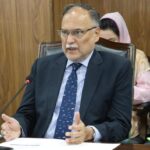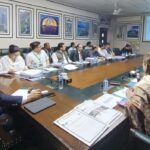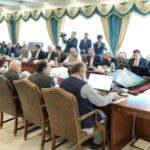ISLAMABAD, Oct 10 (APP): The speakers at a consultative meeting held here by the SDPI on Tuesday underscored the need for timely transitioning of the country’s energy mix over clean and green renewable power solutions of solar and hydropower for a sustainable future amid a strategic position to be maintained at the global forums negotiating on clean energy shift.
The Sustainable Development Policy Institute (SDPI) organized a consultation session with senators and leadership of different political parties to mull over the country’s challenges and opportunities to shift over clean energy for a sustainable future in the prevailing testing times of economic turmoil.
The discussion was participated by Senators Musadik Malik, Engineer Rukhsana Zuberi, Farah Naz, Seemi Ezdi, whereas former MNA Shahida Akhtar Ali and former SAPM Malik Amin Aslam were also present.
Senator Musadik Masood Malik of PML-N said the country’s local energy resources, gas, and production are declining and its precious foreign exchange is burdened with the heavy import bills of oil and gas.
In the middle of these economically unsuitable conditions, there is an elite capture in the energy sector that consumes one-third of the total gas produced for manufacturing of fertilizer whereas the decision was made to provide subsidized fertilizer to the farmers.
Malik underlined that the cheapest energy produced from gas is diverted to fertilizer companies through the maneuvering of the elite capture which diverts the highly expensive electricity tariff to the poor who are voiceless.
He highlighted that such deals are done through legal contracts that pave the way for litigation embedded in it through a capability deficit which is structured in the system.
He said Pakistan’s coal reserves worth $6.3 could be utilized but it would incur environmental impacts, whereas the country should create its strategic position like the Middle East managing its energy transition on its own terms.
Senator, Engineer Rukhsana Zuberi from PPPP said there should be a legal restriction on the attorney general to not appear in the cases of such public or private entities usurping public rights through tainted use of power agreements.
Former SAPM, Malik Amin Aslam said the country has submitted an important document of Intended Nationally Determined Contributions (INDCs) at the United Nations Framework Convention on Climate Change (UNFCCC) which was designed after looking deep into solutions for renewable energy solutions available for the country’s energy mix shift.
He said these commitments were soft and could not incur penalties but were subject to global checks on it. He added that the country is one of the lowest GHG emitters but its emissions are rising and it can be declined below business as usual trajectory from its own resources and it can further reduce it 35% more if gets a climate finance of $100 billion.
Deputy Executive Director SDPI, Dr Shafqat Munir in his opening remarks briefed the participants that the climate crisis was racing at an unprecedented pace whereas the natural disasters due to carbon emissions demand the world to phase out fossil fuels from the human consumption cycle and replace it with eco-friendly solutions of renewables.
Research Fellow, SDPI, Dr Khalid Waleed in his presentation noted that the country had borne serious impacts of global crisis due to the Covid-19 pandemic and the Ukraine-Russia conflict that cast bleak impacts on its energy sector.
He noted that the multifaceted chaos prevailing in the country should be used as a ladder to develop integrated policy solutions for the energy sector.
Ubaid Chaudhary from the Center for Peace and Development Initiatives (CPDI) suggested that the devolution of power generation, transmission infrastructure and distribution mechanisms is need of the hour to make the power sector more reliable and efficient.
Former MNA, JUI-F, Shahida Akhtar Ali appreciated the suggestions by CPDI at the district level and termed it convincing and promising to yield results.
Senator Seemi Ezdi said the dialogue was a much-needed initiative and it was commendable that the Institute would continue it.
Senator Falak Naz said her region of Chitral was worst impacted due to climate change as an entire city in the region was washed away by floods due to glacial melt.
CEO, Policy Research Institute for Equitable Development (PRIED), Badar Alam in his concluding remarks said that there are 30 solar and wind projects lying unimplemented since 2012 despite the fact that their letter interests were signed by the then governments.
The political parties should join their voices and forces on such issues to hold the quarters concerned accountable for the delay in the projects impacting the entire sector and the masses at large.
“We need to come out of easy mind solutions but rather a complex thinking to address an intricate issue of shifting energy mix over sustainable and green solutions,” he added.
APP/ajb-raz







